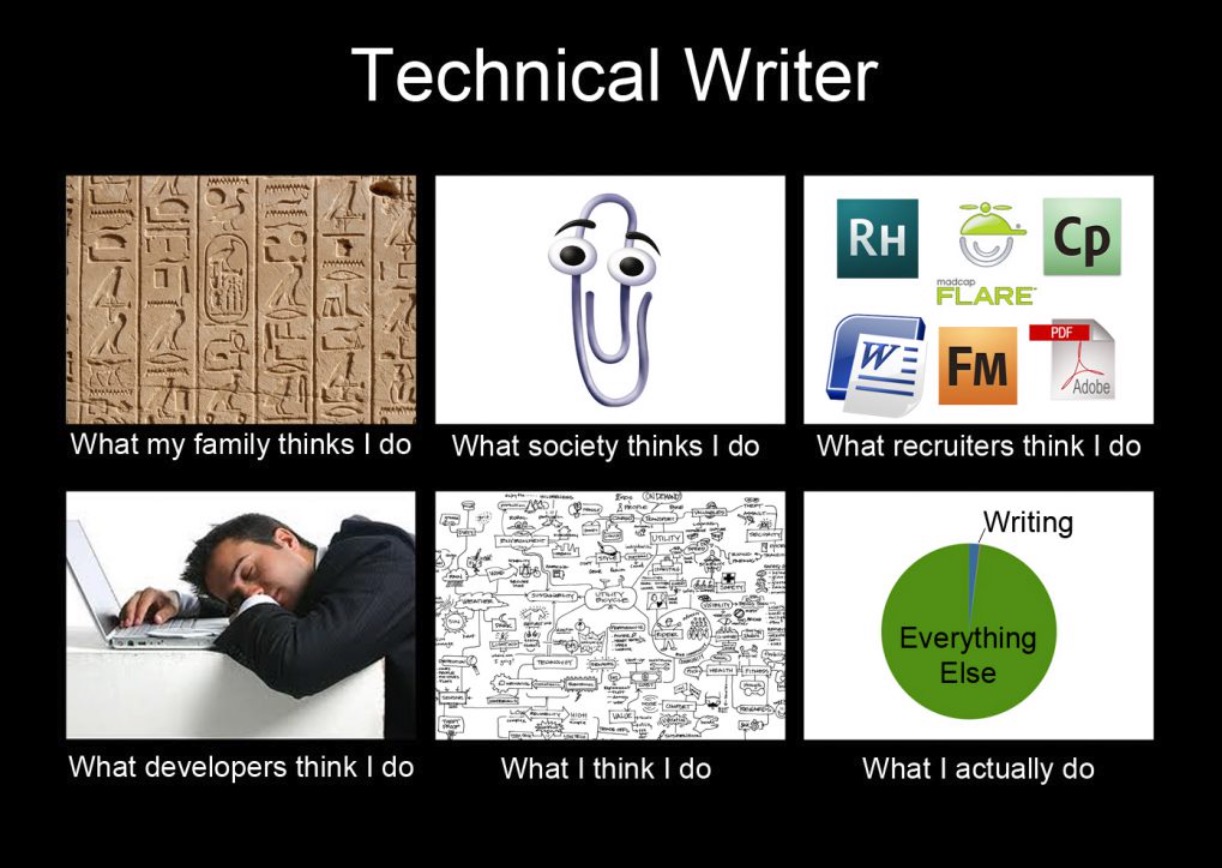My 2024 technical writing trends and predictions
Listen here:
The slides are here.
- Will AI disrupt tech writer job roles?
- Will AI tools expand from niche to mainstream audiences?
- Will the internet dynamics shift away from traditional SEO?
- Job stability?
- Tech writer directions in 2024
- Conclusion
Will AI disrupt tech writer job roles?
There’s high optimism about the potential of AI to lead to major scientific and technological breakthroughs. At the same time, some of the “innovation” AI is offering is simply replacing human labor in some roles — replacing customer support roles with chat agents, for example. And the greater fear, maybe replacing other writing roles, including tech writer, with AI as well.
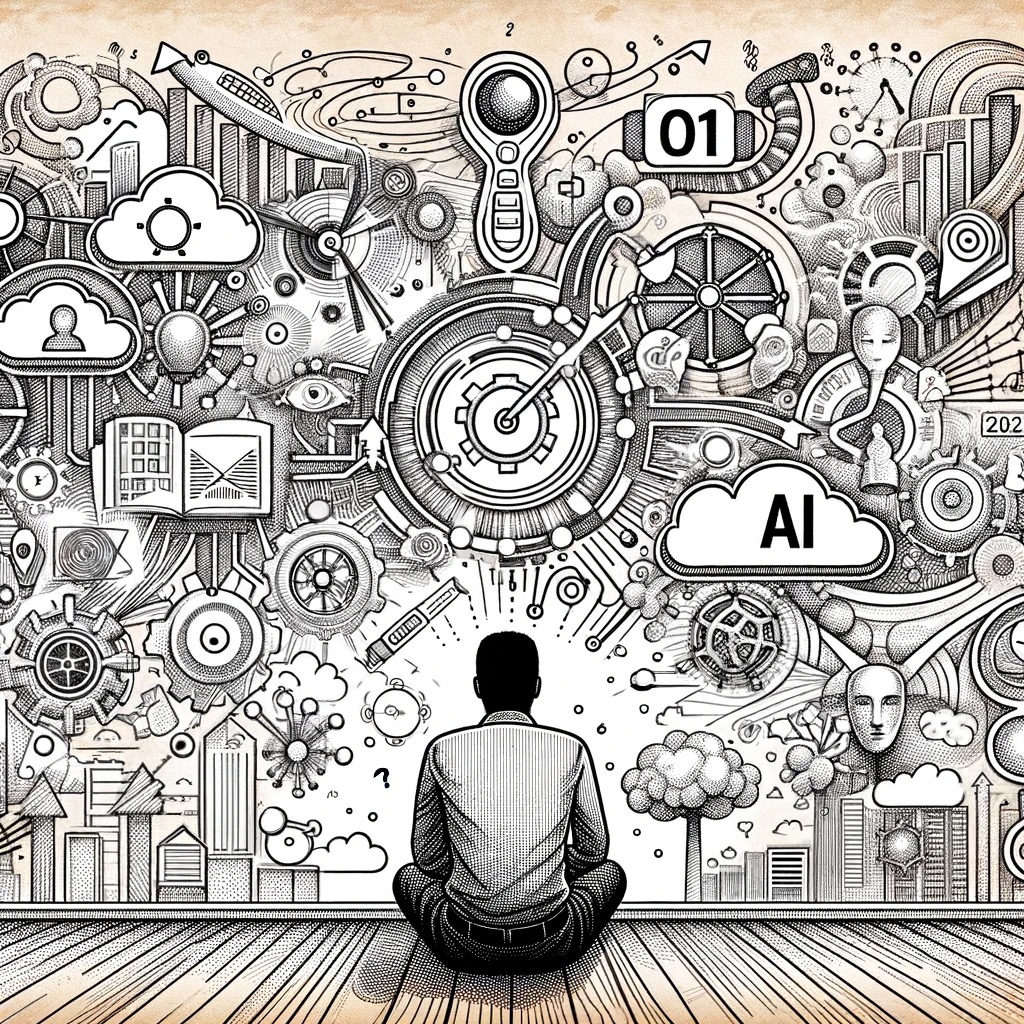
This is the tricky position we tech writers find ourselves in going into 2024. In most companies, few understand what tech writers do but assume that writing is the core activity, so they’re understandably confused when tech writers struggle to incorporate AI into “writing” workflows.
Why is it so hard to implement AI into tech writing workflows? For years, tech writers have been sharing memes like this:
I’m lucky if I spend about 20% of my work day actually writing. In reality, here’s how I spent some of my recent days (before vacation):
- Tried to generate Javadocs for upcoming release
- Discovered problem with output (package summary styling)
- Tracked down tools update from other team that caused the issue
- Spent time interfacing with developer about a fix that still isn’t working
- Audited queue of doc bugs, archiving stale or obsolete issues
- Reviewed doc changes created by others, providing feedback/comments
- Pinged reviewers to look over doc changes I want to submit for an existing update
- Exchanged some details with engineers about notification preferences for pending changelists
- Did some planning for 2024, identifying major writing projects on the horizon
- Participated in a teambuilding activity that took the place of a regular meeting
- Attended another team meeting to talk about writing projects we’re working on, discussing concerns
- Created release notes for a small feature a team is releasing. The draft the engineers gave me was confusing, but clarifying it involved guessing about the meaning, possibly creating a fiction. The person who could sort it out was already out on vacation, so I left the note as is.
And so on. Where in the day am I sitting down to do a bunch of writing, in a way that AI could really help with? Those time periods are only a small portion of the day.
Many days look similar — filled with tasks that aren’t writing and can’t easily be automated by AI. When I do find scenarios where I can use AI (like distilling summaries of long bug threads to get a one-liner for release notes), I find that AI tools can be like power tools: useful if you know what you’re doing and how to use the tools, but not something a non-TW could easily just click to generate docs.
If it’s really true that tech writers spend only a small fraction (~20% of their time) writing, then introducing power tools that speed up writing isn’t going to replace the tech writer. At most, AI tools might make a tech writer 20% more productive. However, tech writers have a brand problem. Regardless of how much time we spend doing heads-down writing, most people think we sit around writing all day.
Some might think tech writers are stalling the AI implementation in an effort to deflect job replacement. I don’t think that’s the case. Nearly every tech writer group I meet is actively trying to identify where and how they can implement AI tools in a way that works. Most are scratching their heads, finding only a few odds-and-ends type of scenarios — not the core work. Especially at the senior tech writing level, most projects and bugs involve a level of ambiguity and complexity that’s not easy to automate by feeding instructions into a machine.
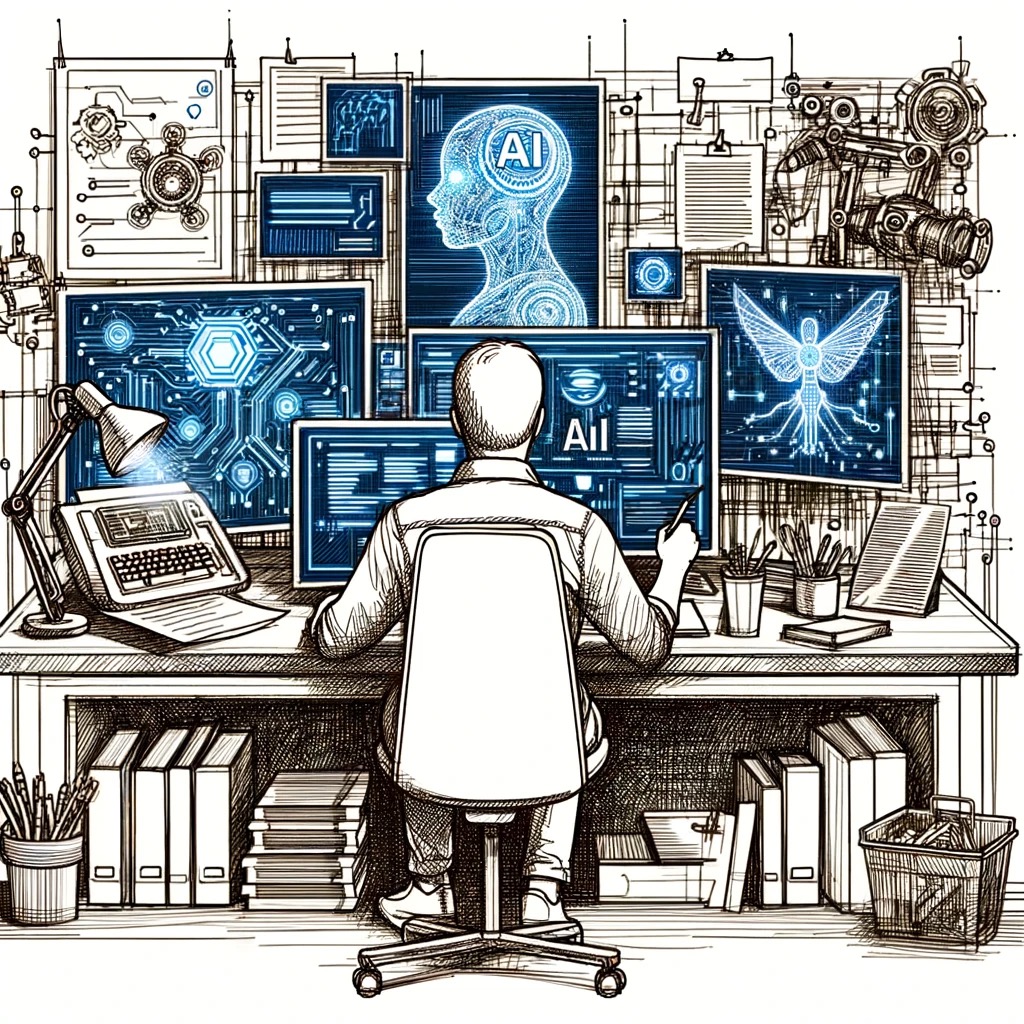
I’m betting that companies will slow hiring of tech writers in 2024 (or even reduce staff), as they try to force writing teams to be more resourceful and creative in implementing AI. But given all the non-writing tasks that consume a tech writer’s day, leaders will continue to experience consternation about why AI isn’t more impactful among tech writing groups.
Will AI tools expand from niche to mainstream audiences?
This leads me to another observation: for the moment, AI tools are most relevant for creator types, not the mainstream. This could be a problem to maintain the momentum. I’ve been particularly taken in by AI tools because I also write a blog and do all the tech for my site and podcast. I generate a lot of content. But for my wife, who works as an academic administrator, she couldn’t be less excited about AI. She groans every time she hears me mention it. My kids are equally uninterested, except when struggling with physics problems and turn to ChatGPT as a last resort.
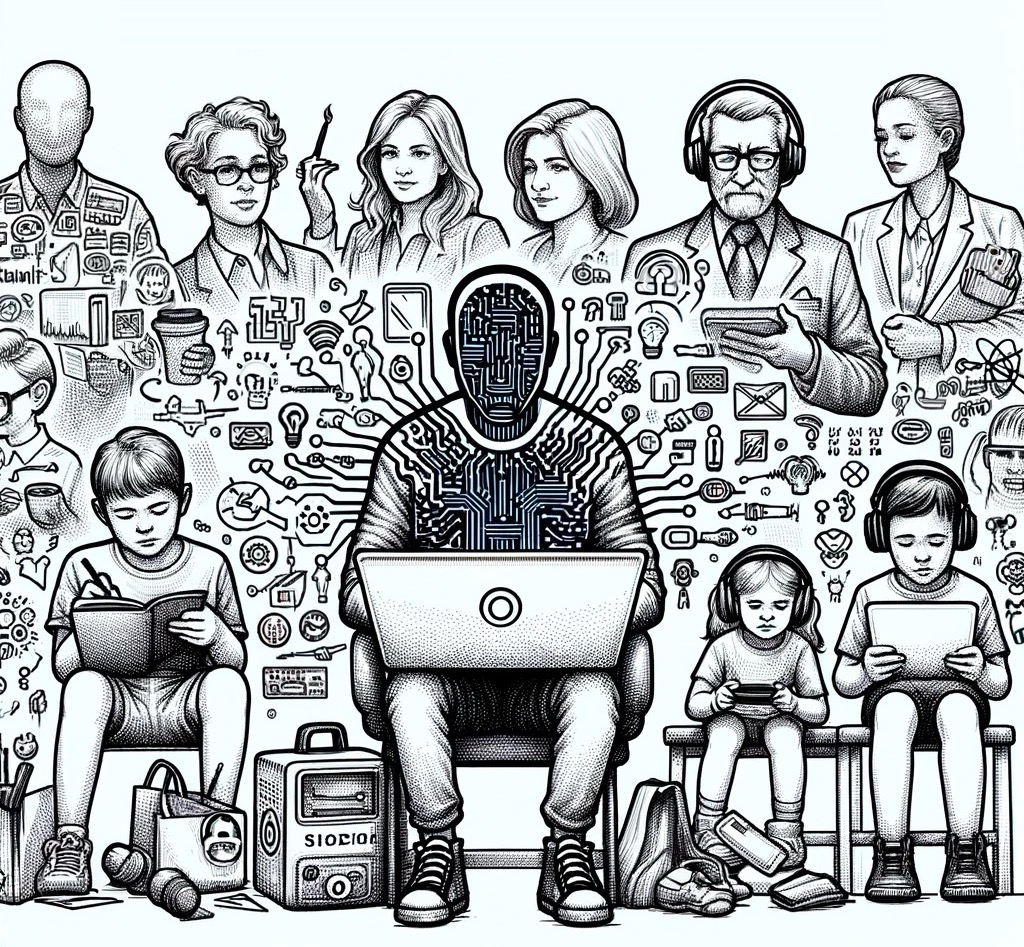
If creators (both content and code creators) only make up a small fraction of society, then will the AI boom be a lot less impactful for mainstream society? If the tech can’t catch the imagination of every household, whether they’re full of creators or not, I’m guessing that AI’s relevance might remain more niche. And if it remains niche, will companies justify such a huge spend on AI? It’s hard to say when it will catch on and become more commonly adopted across different demographics and professions.
When thinking about the heavy AI focus, I can’t help but think of Alexa projects when I worked at Amazon. At Amazon, about 5 years ago, practically everything was focused on Alexa because Alexa was going to be the speech layer for everything and Amazon wanted to be first to market. Well, the Alexification of everything never found a profitable end (not the expected one anyway), and so the massive engineering and resources devoted to Alexifying the physical world ran out of runway. It turns out that most people use Alexa for timers, weather, music, and simple math or measurement questions. Now most digital assistants are on the decline, though these assistants possibly might be rebooted with AI integration.
With AI, will we see a similar trajectory as with Alexa? Will massive resourcing continue in integrating AI into everything, until we find that the applicable audience and use cases are too small to justify the enormous financial costs? I don’t know. AI has so many diverse applications and behind-the-scenes implementations, it’s hard to say. I’m not sure how long companies can be so intensely AI-focused and for how long they will devote resources to AI-ifying things at the expense of other non-AI projects. At some point, AI will need to justify the cost. I think mainstream adoption plays some role in AI’s long-term momentum. When my wife starts using AI, that will be a turning point.
Alternatively, AI could be the wiring behind the scenes of every mainstream product, invisibly adapting to user preferences and behavior patterns without users even being aware of the AI. In this way, AI could lead to innovations and breakthroughs that lead to products and services for mainstream users, even if the mainstream never interacts with AI.
I’m personally curious to see how transformative the technology can be. What if AI paves the way for inexpensive electric vehicles, pharmacogenetic advancements for neuro medications, identification of some unknown forms of life, and more? It’s kind of an exciting time. I’ll return to this topic again later in this post.
Will the internet dynamics shift away from traditional SEO?
Another question about AI is how it will impact search engines. If mainstream people do make the switch from search engines to AI for answers, or if search engines evolve to be primarily AI-driven, it will be interesting to see the impact of the advertising economy and SEO. The general attitude on Hacker News and Reddit is that search engines have deteriorated with ads (what Cory Doctorow calls enshittification, or platform decay) and that AI can provide a new experience, one where search results aren’t dominated by content-distorted SEO and advertisers.
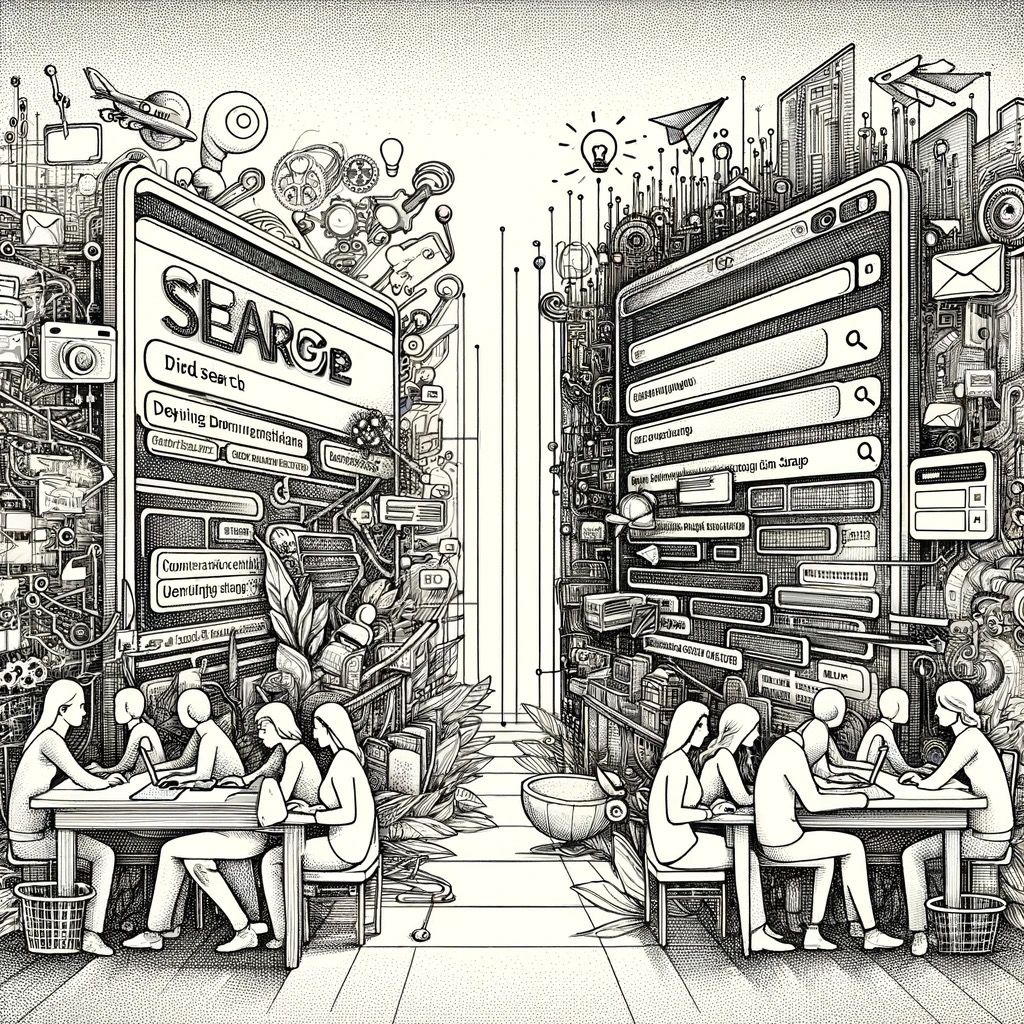
What I don’t see is how the internet economy will thrive this way. Ads allow companies to make their products and services visible. So much is driven by advertising. It’s also one way things become free for consumers. When I write a blog post, I expect that the post will become visible in a search engine and that users will click a link back to my site. If that model (of providing links back to creator sites) becomes disrupted, it could have huge consequences for internet economics. So much of a company’s marketing focus centers on becoming visible in the search engines — that visibility comes through content creation and awareness. Much of that content involves written text.
Job stability?
There are endless trends and predictions I could write about, but one that concerns me most is job stability — a theme I touched on earlier in this post. I find myself wondering if I’m enjoying the last of tech writing’s good years. Are troubling times ahead for tech writers? If tech writer jobs become scarce, would I be willing to relocate to find an existing job? What about moving overseas? How long would the existing tech writer jobs remain? Will my job morph into training and testing LLMs, essentially becoming an LLM content designer?
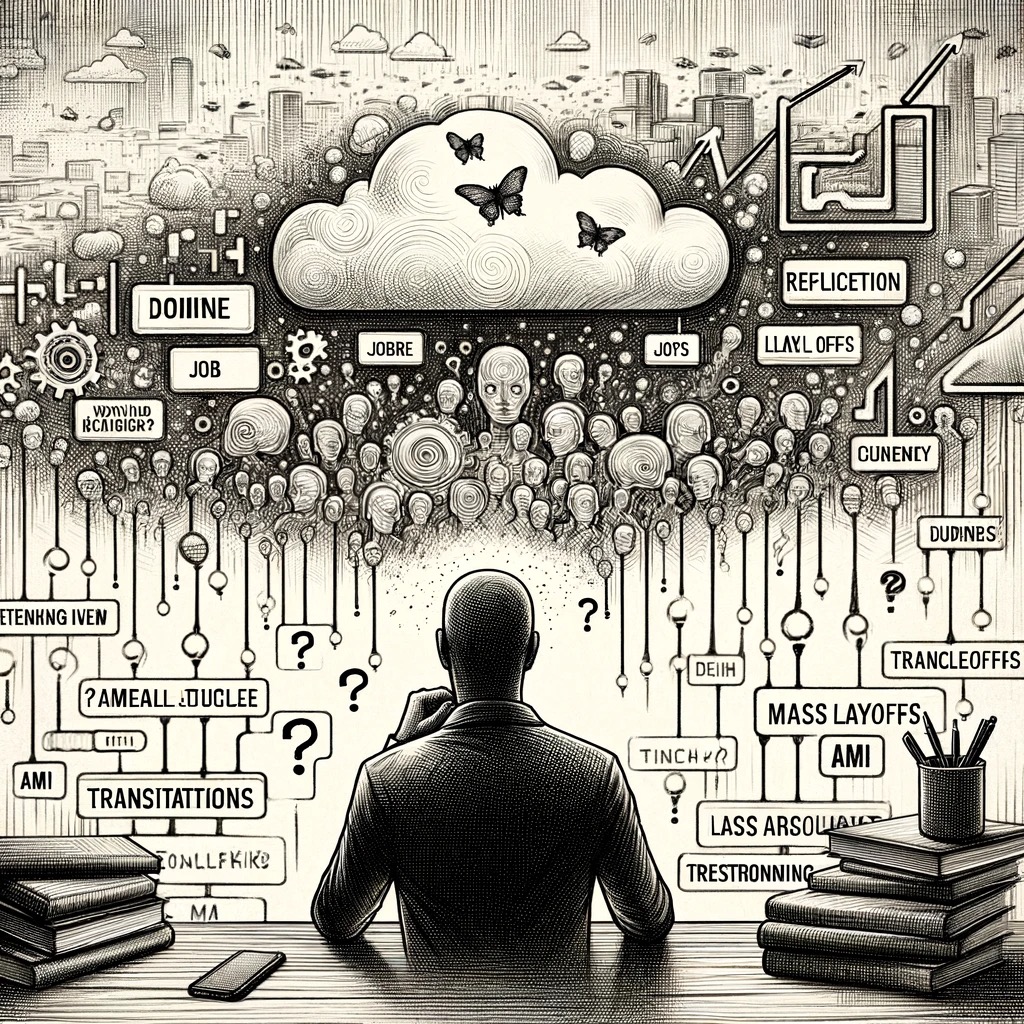
One trend we saw in 2023 was the domino effect one company can have on others. When Twitter laid off 80% of its staff and still managed to keep its services running, stakeholders pressured other companies to follow suit. What followed were massive layoffs everywhere. In 2024, if one company replaces large portions of its staff with AI, won’t stakeholders pressure other companies to follow the same pattern?
In the wake of potential job displacement, what would I do? Take up a temporary service job while retraining in another profession? What other profession could I possibly do? What would I be good at? Starting over at this point in my career seems unthinkable. It’s also unclear what jobs and roles would be safe from automation. UX writer? English teacher? HVAC technician? Tech comm tool developer? A cybersecurity role? Are there any writing roles that are sure bets against automation, and which I could perform well? I don’t know.
I’m sure I should have a plan and be devoting an hour or more a day preparing for this possibility, but I haven’t. I have tried to deepen my expertise in using AI tools for various writing scenarios. I suppose in a pinch, I could start cranking out AI-written content as part of a transformed SEO effort to influence LLMs in some way, whatever that looks like. I briefly experimented with ways to write using more AI-assisted techniques, so maybe I could boost my output to 5-10 AI-written articles a day. But I admit that an AI-assisted post is much less satisfying to write, and this kind of factory mass production of content seems less meaningful (not to mention dreadful for users).
Already, some content is easily being written by AI. Newsletters (the kind that focus on daily news) have transitioned to AI-written summaries, or so I assume. My daily delivery of the news comes with an articulate one-paragraph summary of a series of articles. It’s just what I want, and I don’t care if the summaries are AI-generated. For nearly any summary, I readily welcome AI to do the heavy labor of summarization.
Soon, instead of just the summary, other content will be AI-written, little by little. Perhaps readers will start to assume, expect, and even prefer that most content be AI-written. This could be a monumental shift in our industry: transitioning from manually written content to AI-written content.
At the close of 2023, I find myself once again facing the most perplexing aspect of my career: I’m a good writer and enjoy writing, yet writing is on the verge of extinction. This is something I can never quite figure out. For years, writing has been commodified, devalued, and overlooked as a skill, yet writing is the vehicle of influence, the dominant deliverable that impacts the user experience, and what people spend much of their day reading on their phones.
Tech writer directions in 2024
Let’s talk about some more concrete directions tech writing could take in 2024.
Integrating AI into tech writing workflows
Most likely here’s what will happen. In 2024, tech writers will become more adept at identifying tasks and scenarios to use AI tools. AI tools will become better and more useful, providing quick summaries, doing the formatting (of tables, YAML, XML, etc.) for us, clarifying complex ideas, identifying inconsistencies, and more. Tech writers will learn to use AI tools as frequent companions for a variety of tasks (like I described here).
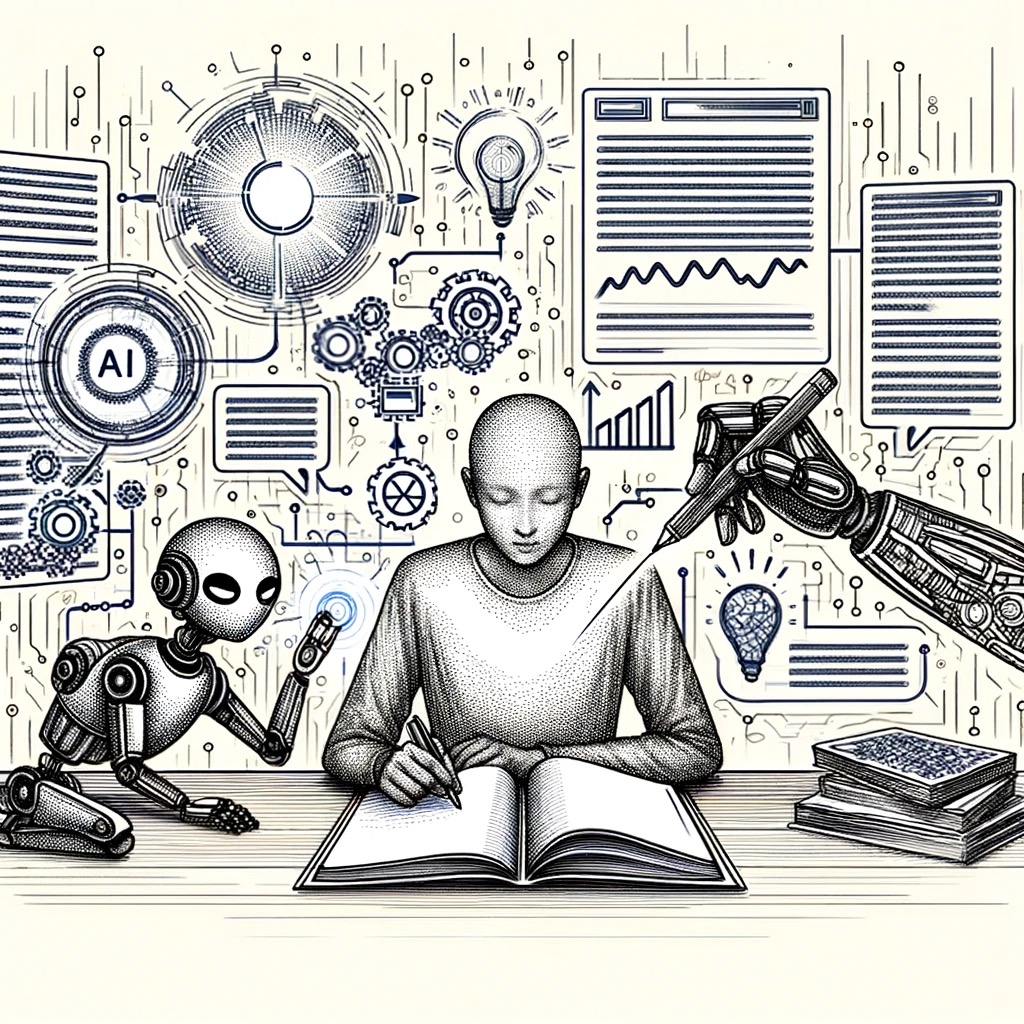
Focus more on content strategy
Soon tech writers will shift focus more toward content strategy, analyzing those areas that seem beyond the output of an LLM. For example, at work I want to create a wikipedia of map data concepts, and analyze how those concepts apply differently across all the organization’s APIs, especially APIs created by different groups. I’d like to document the larger data model in our org, in other words. This emphasis seems more valuable than code samples or technical tutorials. But it would require me to extend beyond my usual realm and look broader. This sort of direction is what content strategy is all about.
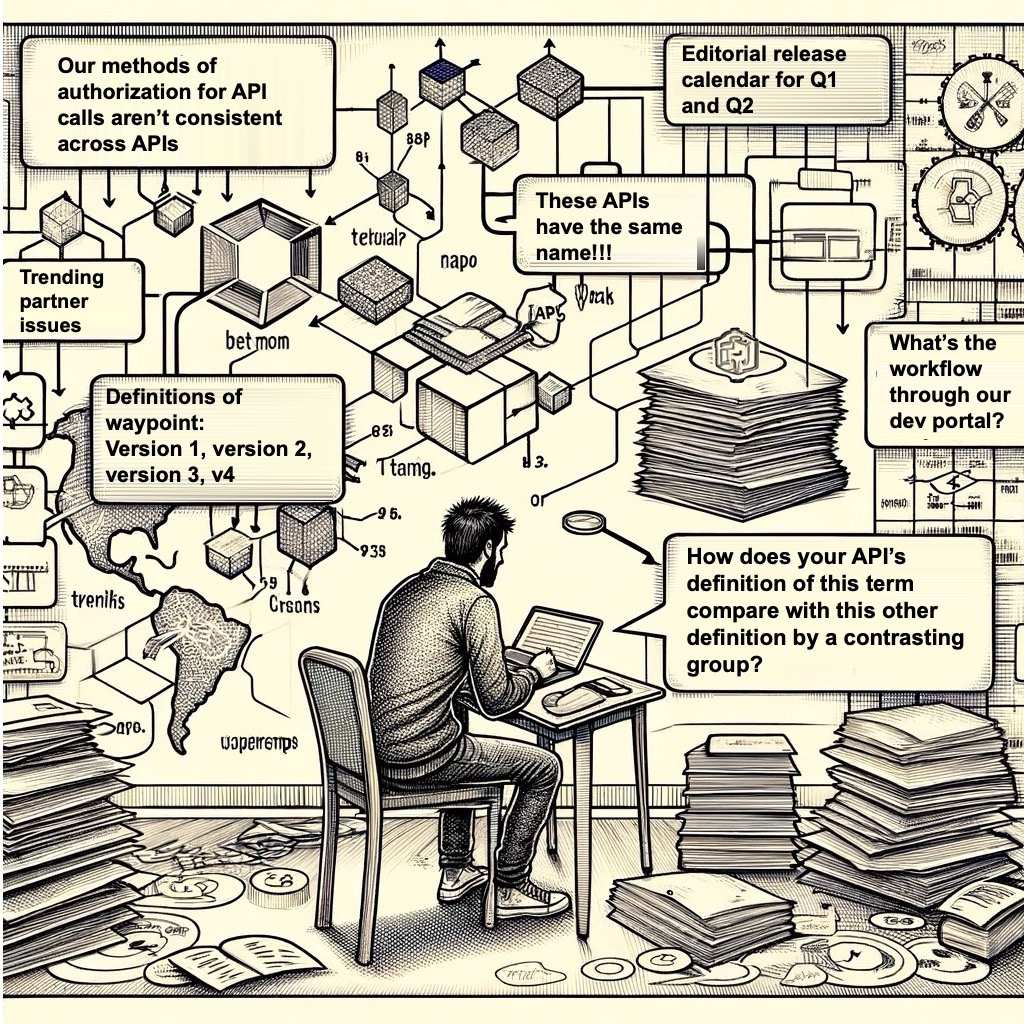
Basically, if we’re not spending time writing content by hand, we’ll spend time doing meta-writing tasks and thinking more strategically about content.
Focus more on chatbot configuration
As user-facing AI chatbots become companions to developer portals, we’ll become more intimate with their output. We’ll listen closely to analytics (what people type into chatbots and what responses they see) and gather details about accuracy. We’ll develop benchmarks to rate LLMs and strive to increase their accuracy against the benchmarks. The noted gaps will lead to more documentation requests and tasks.
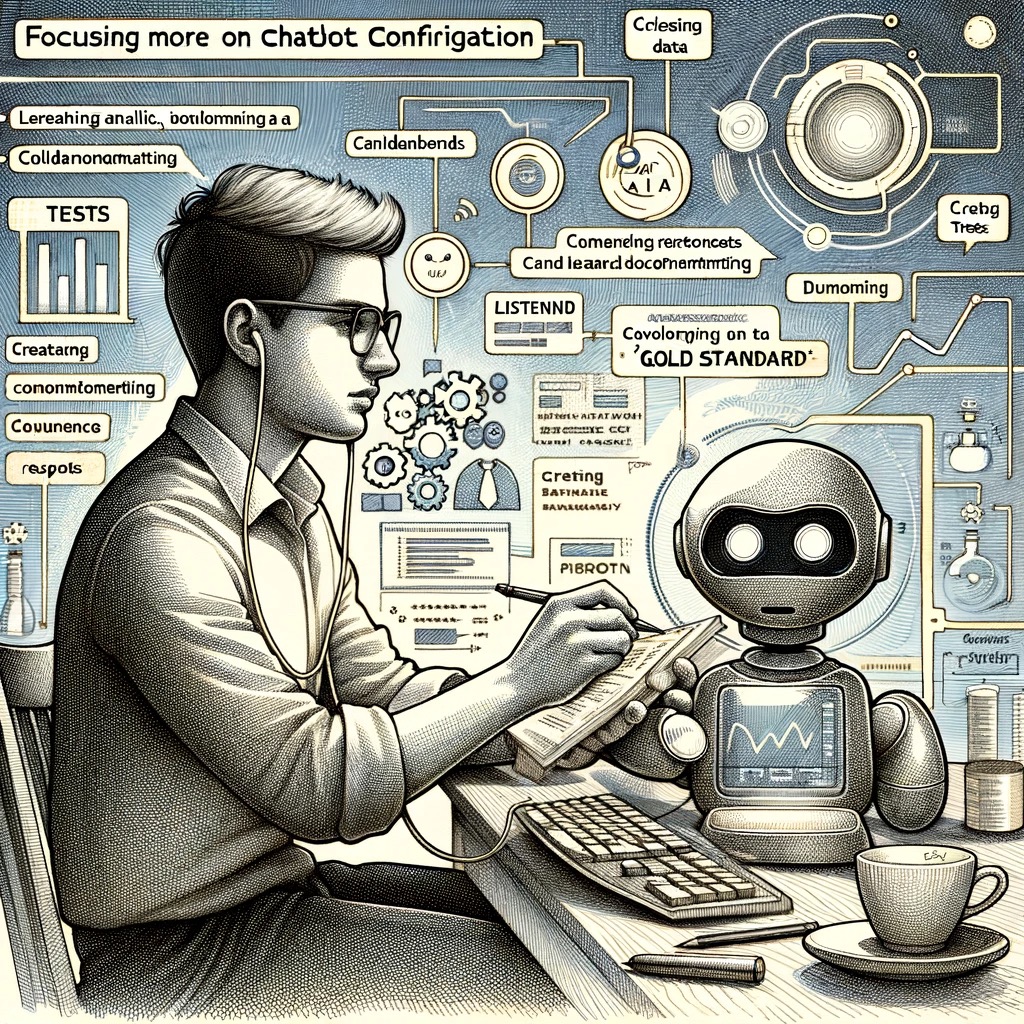
For example, we might define 100 of the most common user questions and issues. Then create an automated test to ask a chatbot these questions. We’ll also create a gold standard of answers, and then create another automated test to evaluate the chatbot’s answers against the gold standard. Based on the discrepancy, our work will consist of closing the gap between the chatbot’s answer and the gold standard. Where the chatbot’s responses are wrong, we’ll have to fine-tune our docs to adjust the responses. This might involve adding lots of Q&A and learning how to weight and influence the LLM’s responses. In short, we’ll become much more focused on the user experience with AI chatbots related to documentation.
Perhaps extending into 2025 and beyond, the tech writer role will evolve to more “content programming” with LLMs. As bots become a primary interface for interaction, the information they provide becomes critical. Techniques for shaping their output will become advanced and sophisticated, but they will require skilled content programmers to shape and craft their responses.
Tech writers will become experts in understanding the buttons and toggles to push and pull, using language and content to influence the bot’s outcome and behavior. This might mean programming the bot’s personality to be more friendly and realistic by providing friendly, realistic examples and analyzing/correcting other output.
Becoming more expert with AI chatbots and documentation will become a good way to stay marketable, at least for the immediate horizon.
Extending into new domains
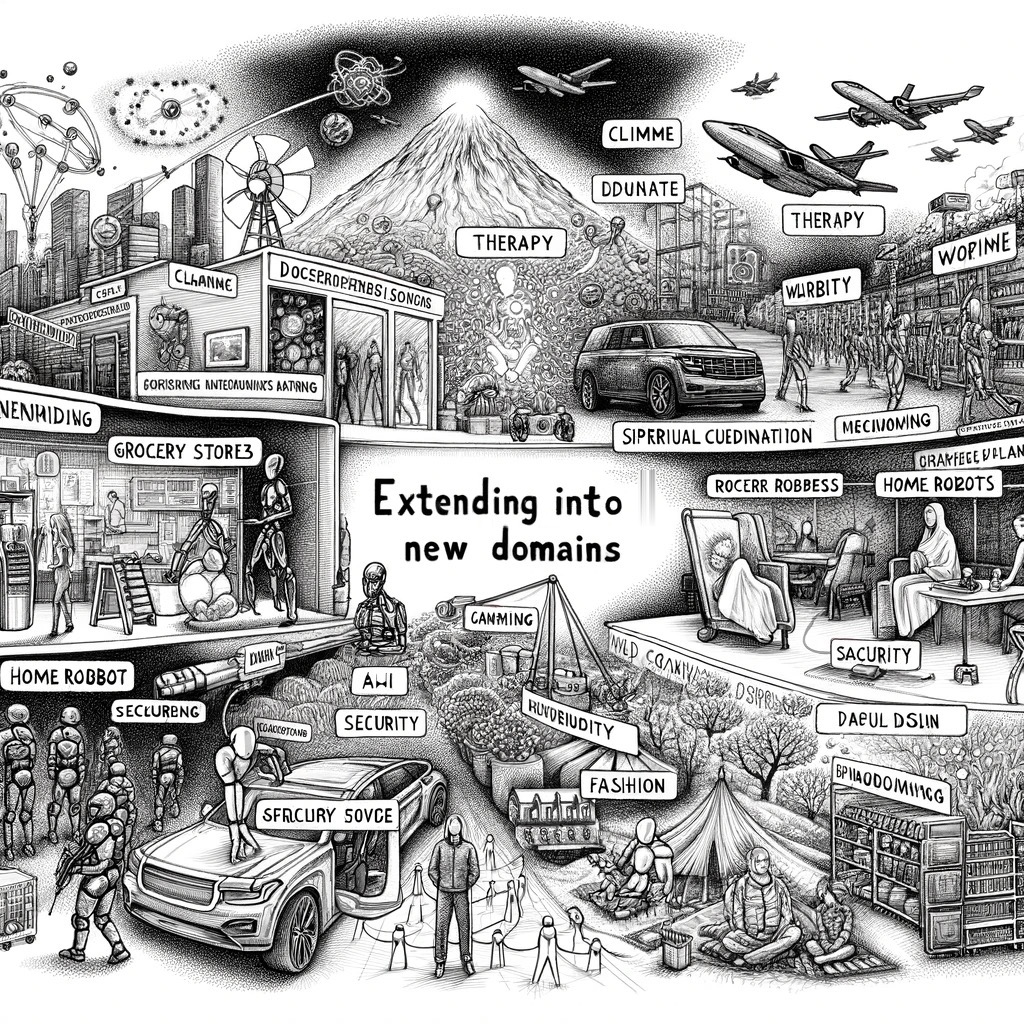
As AI becomes more integrated into other domains, especially less tech-centered domains, there will be a need for documentation and product innovation in these new domains. Some of these domains will be challenging, but might include AI climate modeling (how do you feed weather readings into AI tools to decompose forecast outputs?), AI therapy (how can an AI discern and adapt to the nuanced emotional states and needs of different individuals?), AI grocery stores (how can AI manage inventory, predict consumer trends, and personalize shopping experiences?), AI military applications (just how do you program these spy bee drones?), AI security monitoring (how can AI differentiate between normal and suspicious activities without infringing on privacy?), AI home security robots (how do these robots make decisions about threats and ensure the safety of household members?), AI fashion designers (how can AI predict and set fashion trends while maintaining a sense of personal style for users?), AI spiritual advisors (how can AI provide spiritual guidance that resonates with individual beliefs and values?), and more.
The idea is that tech will spread its influence into many new and unfamiliar domains that weren’t previously tech-saturated. This will create a need for more tech customization, custom APIs based on customer demands, and more.
One principle we learned in the pandemic is that as technology thrives, so do tech writing jobs. Consider the case of cars. As cars shift toward becoming software-defined vehicles, there are more needs for software engineers and technical writers — documenting energy models, documenting APIs that deliver data and in-vehicle services, APIs that focus on telemetry and analytics, and more.
As tech increases, so does the need for tech writing. This principle calms me more than any other when thinking about job stability. Our world is only becoming more and more technology-focused.
APIs transition into behind-the-scenes APIs for AIs
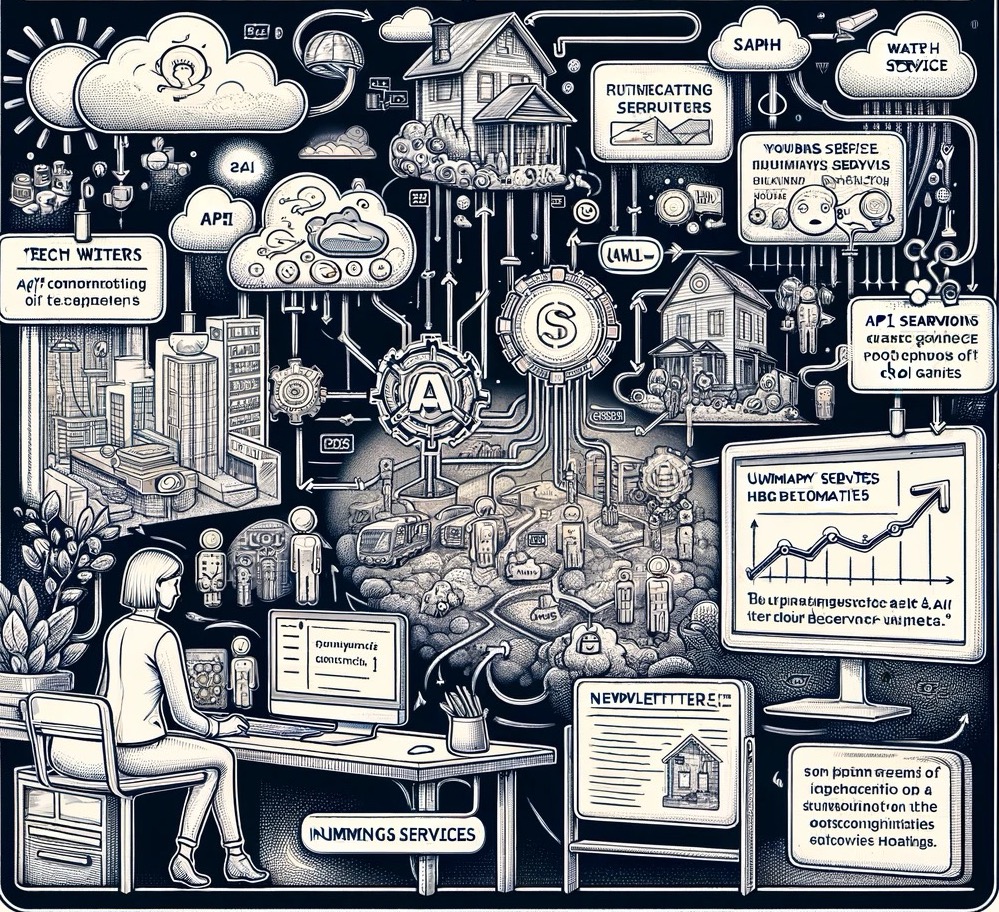
APIs will continue to remain prominent, but tech writers will document how to integrate APIs for AI agents. That is, they’ll focus on APIs in the backend of chatbots (the APIs that kick in based on user chat queries, such as queries about the weather triggering weather APIs, or queries about diagrams triggering graphical APIs, and such). APIs will become the plumbing of LLMs to extend their capabilities in interesting and powerful ways.
Our work in testing the APIs won’t simply be whether the APIs provide the right data in responses, but whether the user query correctly triggers the API on the backend and provides the right data and result. Behind the simple chat interface will be a host of APIs and technologies that can be triggered.
Chains of AI agent workflows will also expand the use cases for APIs. As users daisy-chain together various workflows, APIs will connect each link in the chain. For example, consider the case of producing a newsletter. One agent searches the web for relevant links on a topic. When finished, those results are presented to a summary service to create summaries of the articles. When finished, the summaries are presented to an image decoration service to find relevant images for the summaries. When finished, the summarized and decorated content is delivered to a newsletter templating service to package the content into the right news template. When finished, the formatted newsletter is inserted into an email delivery service with various email parameters configured.
APIs will connect these services together, allowing for more complex services to execute seamlessly. The ability to decompose complex workflows into individual steps, and then connect those steps together will likely involve more APIs and other services — these APIs and services will require documentation, and chances are, technical writers will still be needed.
Conclusion
As I said earlier, I’m less confident about how everything will play out in 2024. But despite the uncertainty of job replacement, and the hiring freezes, slowdowns, and layoffs we’ve seen in the industry, there’s a good chance that AI will ignite a technology explosion, opening up tech writing jobs in many new domains, creating needs to document AI-oriented APIs, and generally driving up the level of technology saturation and use across mainstream society.
Images in this post are from DALLE.
About Tom Johnson

I'm an API technical writer based in the Seattle area. On this blog, I write about topics related to technical writing and communication — such as software documentation, API documentation, AI, information architecture, content strategy, writing processes, plain language, tech comm careers, and more. Check out my API documentation course if you're looking for more info about documenting APIs. Or see my posts on AI and AI course section for more on the latest in AI and tech comm.
If you're a technical writer and want to keep on top of the latest trends in the tech comm, be sure to subscribe to email updates below. You can also learn more about me or contact me. Finally, note that the opinions I express on my blog are my own points of view, not that of my employer.





